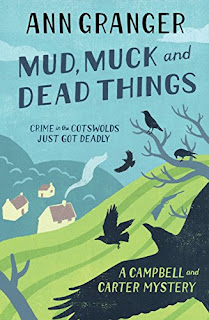Rating: 3/5
Review:
Undemanding
This was a decent, undemanding cosy crime novel until the ending,
which I’m afraid I found very silly indeed.
The plot concerns
the death of a young woman in the Cotswolds, investigated by
Inspector Jess Campbell and her new boss Superintendent Ian Carter,
whose partnership is new and scarcely develops during this first
book. The investigation involves an array of local characters who
are reasonably well portrayed if a little on the predictable side –
the rich and boorish incomer, the horsy, bossy mother and so on. It
all develops a little slowly but readably...until an utterly absurd
development toward the end which made me say “Oh, please!” out
loud and rather lost me from there on in.
Ann Granger’s
prose is good, although her characters do tend to talk in novelistic
paragraphs rather than as natural speech, and for most of the book I
thought I’d be rounding 3.5 stars up to 4. However, the last 50
pages or so changed my mind. I can give this a cautious and
qualified recommendation as a light, undemanding read, but it does
come with reservations.








